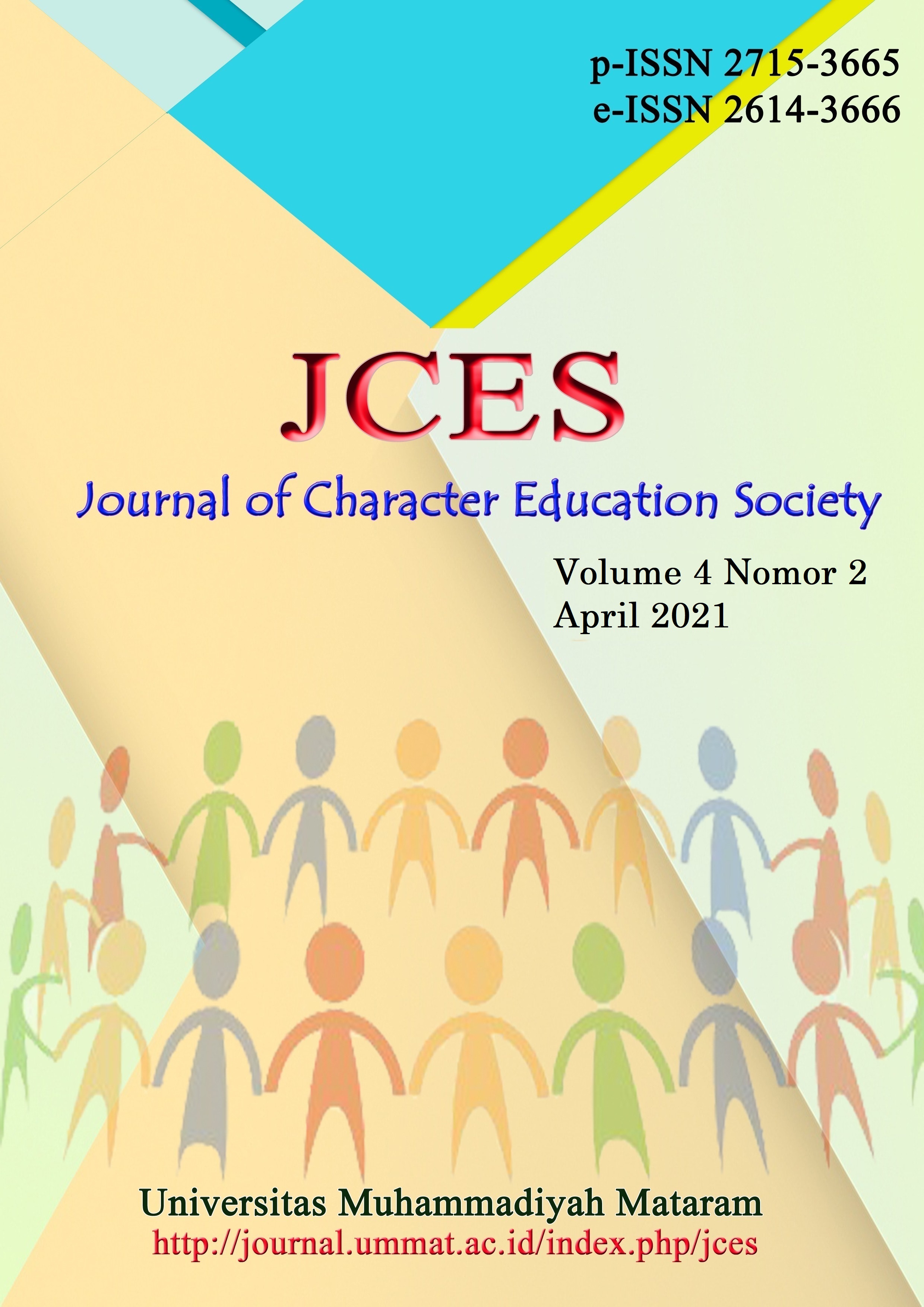IMPROVING EARLY CHILDHOOD EDUCATION TEACHER PROFESIONAL COMPETENCE THROUGH STEAM BASED LEARNING PLAN TRAINING
DOI:
https://doi.org/10.31764/jces.v4i2.4068Keywords:
Professional Competence Improvement, ECE Teachers, Covid-19 Pandemic.Abstract
Abstrak: Profesi guru sebagai bagian penting dari pendidikan, dimana guru adalah pencetak generasi penerus bangsa. Salah satu kompetensi yang harus dimiliki guru adalah kompetensi professional, yaitu kemampuan menguasai materi secara luas dan mendalam. Di era pandemic Covid-19 menjadi tantangan tersendiri untuk guru PAUD meningkatkan kompetensi profesionalnya. Tujuan kegiatan pengabdian ini adalah memberikan pelatihan kepada guru PAUD tentang bagaimana meningkatkan kompetensi professional guru di masa pandemic Covid-19. Pengabdian masyarakat ini dilaksanakan secara daring melalui virtual zoom dengan melibatkan 40 guru PAUD yang ada di kecamatan Mrebet dan Purbalingga, Jawa Tengah. Kegiatan pelatihan ini dimulai dari tahapan perencanaan, pelaksanaan, evaluasi dan rencana tindak lanjut. Hasil dari pelatihan secara daring guru-guru PAUD di Kecamatan Mrebet dan Purbalingga adalah terlihat adanya peningkatan kompetensi profesional Guru PAUD dalam penggunaan teknologi aplikasi zoom dan meningkat kemampuannya dalam menyusun perencanaan pembelajaran daring untuk PAUD, sebagai bentuk nyata untuk peningkatan kualitas guru PAUD Indonesia yang berperan penting dalam menyongsong era society 5.0.
Abstract: The teacher profession is an important part of education, where teachers are the creators of the nation's next generation. One of the competencies that teachers must have is professional competence, namely the ability to master material extensively and deeply. In the era of the Covid-19 pandemic, it is a challenge for early childhood teachers to improve their professional competence. The purpose of this service activity is to provide training for ECE teachers on how to improve teacher professional competence during the Covid-19 pandemic. This community service was carried out boldly through virtual zoom by involving 40 ECE teachers in Kecamatan Mrebet and Purbalingga, Central Java. Training activities start from the planning, implementation, and follow-up planning stages. The results of online training for early childhood teachers in Mrebet and Purbalingga Districts are that there is an increase in the professional competence of early childhood teachers in the use of zoom application technology and an increase in their ability to plan online learning for early childhood education, as a concrete form of improving the quality of Indonesian PAUD teachers who play an important role in welcome changes in the era of society 5.0.
References
Agustin, M., Puspita, R. D., Nurinten, D., & Nafiqoh, H. (2020). Tipikal Kendala Guru PAUD dalam Mengajar pada Masa Pandemi Covid 19 dan Implikasinya. Jurnal Obsesi : Jurnal Pendidikan Anak Usia Dini, 5(1), 334. https://doi.org/10.31004/obsesi.v5i1.598
Andrisyah dan Asih Nur Ismiatun. (2021). The Impact of Distance Learning Implementation in Early Childhood Education Teacher Profesional Competence. 5(2), 1815–1824. https://doi.org/10.31004/obsesi.v5i2.1009
Asmarani, N. (2014). Peningkatan Kompetensi Profesional Guru di Sekolah Dasar. Jurnal Bahana Manajemen Pendidikan, 2(1), 503 †510.
Ayuni, D., Marini, T., Fauziddin, M., & Pahrul, Y. (2020). Kesiapan Guru TK Menghadapi Pembelajaran Daring Masa Pandemi Covid-19. Jurnal Obsesi : Jurnal Pendidikan Anak Usia Dini, 5(1), 414. https://doi.org/10.31004/obsesi.V5i1.579
Darmiatun, S. Dan N. (2019). Peningkatan Kopetensi Pedagogig Dan Profesional Guru Tk Melalui Program Diklat Pengembangan Keprofesian Berkelanjutan ( Pkb ) Di Kabupaten. Jurnal Pendidikan Tambusai, 3(2), 704–714.
Hashyim, F. N. (2018). Optimalisasi Peningkatan Kompetensi Profesional Guru PAUD Melalui Lesson Study. Sendika Fkip Uad, 2(1), 1–6.
Jajat Sudrajat. (2020). Kompetensi Guru Di Masa Pandemi Covid-19. Jurnal Riset Ekonomi Dan Bisnis, 13(1), 100–110. http://journals.usm.ac.id/index.php/jreb
Kemdikbud. (2020). Surat Edaran Nomor 4 Tahun 2020 Tentang Kebijakan Pelaksanaan Pendidikan dalam Masa Darurat Covid-19.
Kementrian Pendidikan Nasional RI. (2013). Peraturan Menteri Pendidikan dan Kebudayaan Republik Indonesia No. 137 Tahun 2014 tentang Standar Nasional PAUD
Kemendikbud. (2020). Surat Edaran Sekretaris Jenderal No.15 Tahun 2020 Pedoman Pelaksanaan Belajar Dari Rumah Selama Darurat Bencana COVID-19 di Indonesia. Sekretariat Nasional SPAB (Satuan Pendidikan Aman Bencana), 15, 1–16.
No.137 Tahun 2014 Pasal 25 Kementrian Pendidikan Nasional RI. (2014). Standar Nasional Pendidikan Anak Usia Dini No 137 Tahun 2014. Peraturan Menteri Pendidikan Dan Kebudayaan Republik Indonesia, 1–76.
https://portaldik.id/assets/upload/peraturan/PERMEN KEMENDIKBUD Nomor 137 Tahun 2014 STANDAR NASIONAL PENDIDIKAN ANAK USIA DINI.pdf
Rohita. (2020). The Ability of Ece Teachers To Use ICT in The Industrial Abstrak. Jurnal Obsesi : Jurnal Pendidikan Anak Usia Dini, 4(2), 502–511. https://doi.org/10.31004/obsesi.v4i1.339
Setiawan, Y. E., & Syaifuddin, S. (2020). Peningkatan Kompetensi Profesionalitas Guru Melalui Pelatihan Desain Pembelajaran Peta Konsep. Jurnal Pengabdian Kepada Masyarakat, 26(3), 148. https://doi.org/10.24114/jpkm.v26i3.16377
Tanang, H., & Abu, B. (2014). Teacher Professionalism and Professional Development Practices in South Sulawesi, Indonesia. Journal of Curriculum and Teaching, 3(2). https://doi.org/10.5430/jct.v3n2p25
Wiranti, N. (2015). Pengembangan Profesionalitas Guru Taman Kanak Kanak Bersertifikasi Di Kecamatan Nanggulan Kulon Progo. Thesis. 1–27.
Downloads
Published
Issue
Section
License
Authors who publish articles in JCES (Journal of Character Education Society) agree to the following terms:
- Authors retain copyright of the article and grant the journal right of first publication with the work simultaneously licensed under a CC-BY-SA or The Creative Commons Attribution–ShareAlike License.
- Authors are able to enter into separate, additional contractual arrangements for the non-exclusive distribution of the journal's published version of the work (e.g., post it to an institutional repository or publish it in a book), with an acknowledgment of its initial publication in this journal.
- Authors are permitted and encouraged to post their work online (e.g., in institutional repositories or on their website) prior to and during the submission process, as it can lead to productive exchanges, as well as earlier and greater citation of published work (See The Effect of Open Access).

